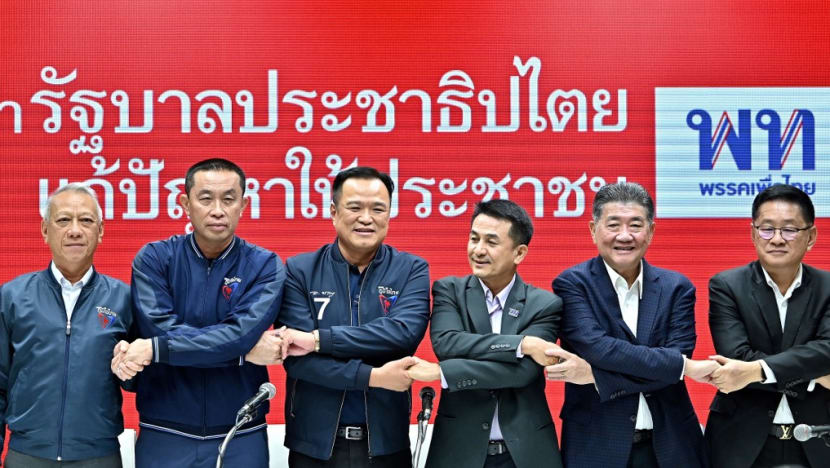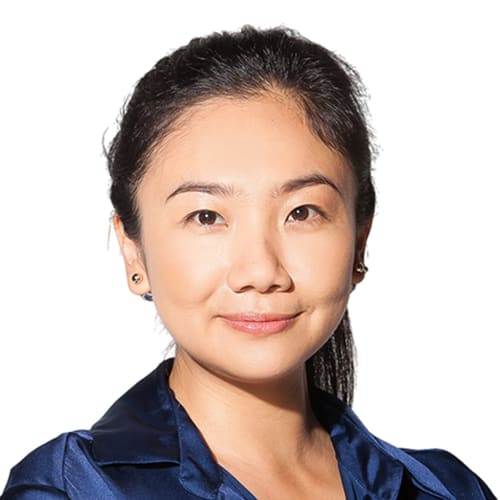Analysis: Democracy champion to new face of conservatives - how Pheu Thai's moves to regain power could shape Thai politics
To win the political game, the Pheu Thai Party is trading its image for a new alliance.

Pheu Thai Party leader Chonlnan Srikaew (third from right) and Bhumjaithai Party leader Anutin Charnvirakul (third from left) hold hands following a press conference at the Pheu Thai Party's headquarters in Bangkok on Aug 7, 2023. (Photo: AFP/MANAN VATSYAYANA)
BANGKOK: The political image of the Pheu Thai party is shifting from that of democracy champion to a new face of the conservative camp, as it seeks to regain power through moves that could shape Thai politics, say analysts.
Forced to play by constitutional rules that put it at a disadvantage, the veteran party backed by former billionaire prime minister Thaksin Shinawatra has pulled political manoeuvres to win the premiership, by breaking off the alliance with election-winning Move Forward and joining forces with the old ruling camp.
Pheu Thai’s hand was strengthened on Wednesday (Aug 16) when Thailand's Constitutional Court rejected a request from Move Forward to review a parliamentary decision blocking its prime ministerial candidate Pita Limjaroenrat from being re-nominated.
With the court ruling paving the way for another legislature vote on a prime minister next week, observers say all signs are pointing towards Pheu Thai having to join hands with military-linked parties to secure a chance to govern.
And by doing so, it is shedding light on Thailand’s political landscape where three ideologies are competing for dominion, one analyst adds.
“These are the progressive, the centrist-conservative and the traditionalist,” said Dr Siripan Nogsuan Sawasdee from the Faculty of Political Science, Chulalongkorn University.
She added that the shift in Pheu Thai’s political image towards the right wing has brought its conservative nature into focus, thus breaking its facade falsely perceived by some voters as leftist.
Related:
A MATHEMATICAL CHALLENGE
First, here's the mathematical challenge confronting Pheu Thai in its quest to form and lead the next government.
After parting ways with Move Forward, Pheu Thai has been pushing for its candidate Srettha Thavisin to become Thailand’s 30th prime minister – an onerous task that requires the approval of at least 375 parliamentarians or more than half of the national assembly.
The condition is stipulated in the current constitution, written by a military-appointed committee after a coup d’etat in 2014.
Designed to extend the establishment’s political control, the law is a legacy of incumbent Prime Minister Prayut Chan-o-cha, a general-turned-politician who deposed Pheu Thai’s previous government nine years ago.
It gives power to the military-controlled Senate, whose five-year term ends May 11 next year, to jointly select the prime minister with the House of Representatives.
This means that without the Senate’s support, the political stalemate could drag on till then. And in the event that none of the listed candidates can be appointed for any reason, the constitution allows a process that could bring in an “outsider prime minister”.
The Pheu Thai-led coalition currently commands 238 votes and still needs 137 more to secure the premiership for Mr Srettha.
On Tuesday, Move Forward declared it will not vote for Pheu Thai’s prime ministerial candidate, adding more obstacles and dilemmas to its quest for power.
With Move Forward out of the equation, Pheu Thai does not have other options but to ally itself with military-linked parties Palang Pracharat and United Thai Nation.
The first belongs to Gen Prawit Wongsuwon, Thailand’s incumbent deputy prime minister and former army chief, who played a key role in the Prayut junta. The latter was led by the coup maker himself until his resignation last month.
Their combined 76 votes and influence on 249 senators could give Pheu Thai a final push to form the government when parliament reconvenes on Aug 22 to select the prime minister.
SECURING THAKSIN’S RETURN
Pheu Thai’s race to form the government coincides with an expected return of Mr Thaksin, who was ousted from power in a military coup in 2006.
The Shinawatra family has close ties with Pheu Thai, which is a reincarnation of Mr Thaksin’s old political group Thai Rak Thai. His youngest daughter Paetongtarn Shinawatra is in fact one of the party’s prime ministerial candidates.
Currently living in exile in Dubai, United Arab Emirates, the ex-prime minister initially planned to come home on Aug 10 but later postponed his trip, citing medical appointments. For political observers, however, the delay was caused by the fact that Pheu Thai had not secured the premiership just yet.
“The prime ministerial post is the most important thing,” said Dr Thanaporn Sriyakul, president of the Political Science Association of Kasetsart University.
He believes Pheu Thai is doing everything it can to win the country’s top job, even though it means going against its campaign rhetoric and promise not to work with the military-affiliated parties.
Pheu Thai’s alliance with military-linked parties could also ensure a safe homecoming of its fugitive patron Thaksin. Despite speculation that Pheu Thai may offer the premiership to Gen Prawit from Palang Pracharat in exchange for Mr Thaksin’s return, some analysts disagree.
“People may think that giving the premiership to Prawit would get Thaksin home but how can Pheu Thai be sure that if it doesn’t get to lead the government, Thaksin will be able to return safely?” said Dr Siripan.
A NEW FACE OF THE CONSERVATIVE CAMP
According to Dr Siripan, Pheu Thai’s moves have offered more transparency to its true political position. It compromises with traditional authority, preserves traditional institutions and progresses carefully in accordance with the rules.
“Previously, people might have viewed Pheu Thai as a slightly leftist party,” she said, “but now, they’re turning into a leader of the conservative.”
On the left of Thailand’s political spectrum is the young and progressive Move Forward Party, whose reformist policies and liberal stance have alienated it from other political groups.
On the right are traditionalists – the likes of Palang Pracharat, United Thai Nation, Democrat and Bhumjaithai – which favour the old way of social structure and customs.
“By having Move Forward and Pheu Thai, which have different methodologies but stand on the same democratic principles, the people now have clear options and don’t have to rely on the traditionalist parties,” Dr Siripan said.
ELECTORAL PUNISHMENT IN THE NEXT ELECTION
Although Pheu Thai has not confirmed its partnership with Palang Pracharat or United Thai Nation, its deputy leader Phumtham Wechayachai expressed confidence on Tuesday that Mr Srettha will win the premiership and that the government formation would complete around the end of this month or early next month.
“Whoever votes for us, we’ll thank them. They’ll be in the equation and we’ll consider them, although there is no commitment here. If they don’t vote for us, they’ll stay out of the equation,” he said in a press conference.
As Pheu Thai plays along the political game where the old regime has the upper hand, analysts believe its actions could undermine its political future.
Dr Thanaporn of Kasetsart University said the Thai people are “fed up with this kind of politics”.
“This kind of politics is one where promises made to the people are meaningless,” he added.
“Once they cast their votes, their time is over. The rest is up to politicians, who can do whatever they want. The people don’t get to intervene. This is the old politics, and we’re seeing it right now.”
Dr Siripan said Pheu Thai has had to weigh dilemmas such as electoral punishment in the next election and losing its image as a beacon of democracy, against the prospects of regaining power and people’s trust.
“These are the two major losses it could suffer and they’re related to a loss of confidence and faith in the party,” said the political scientist.
She added that Pheu Thai’s brand is its ability to deliver policies, and the only way to do so is by forming a Pheu Thai-led government with the old ruling camp.
“They hope to use their ability in running the country and reviving the economy to regain people’s trust. That’s Pheu Thai’s gamble.”
















